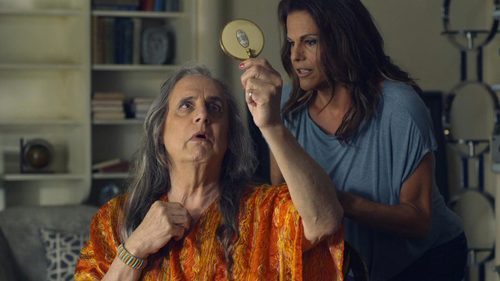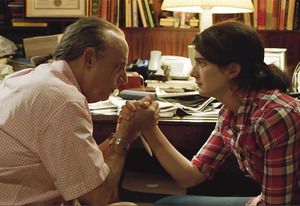Transparent

So we're watching the much-lauded Amazon Streaming show Transparent and we've hit the flashback episode and debating whether the show has jumped the shark. After all, in spite of clever writing and astonishingly subtle and empathetic performances by the cast (chiefly of course Jeffrey Tambor, who secured national treasure status back in the days of The Larry Sanders Show and now approaches deityhood), the show was already testing my tolerance for the clueless misbehavior of extraordinarily entitled well-heeled white Angelenos who lack the last name of Bluth. What is going on with Ali, anyway, as she watches her thirteen year-old self flirt dangerously with a grown man, or maybe it's the other way around? Then I find myself saying out loud, "The weirder it gets, the better it gets." And then I'm listening to the echo.
Inadvertently, while binge-watching an example of what everyone too strenuously agrees to be the dominant art form of our time, I have stumbled across an aesthetic truth, or my truth of the aesthetic. Weirdness, strangeness, risking the alienation of audiences: only by trangressing whatever it is you have to transgress can one deliver genuinely valuable, genuinely powerful shocks of recognition. And recognition is the name of the game--something akin to, yet far from, the authenticity that older models of art hold up as the supreme value (something Transparent, with its sometimes sly, sometimes dopey challenges to gender normativity, is delighted to discard. And let me take advantage of this parenthetical to note that the show's depictions of academia--from the wealth of Mort/Maura's retired political science prof to the broad and unfunny satire of a women's studies classroom--is the weakest dimension of this show, precisely because it deprives this viewer, at any rate, of that salutary shock.)
We're long past shock value for its own sake, I hope--shock in that old-school epater-les-bourgeois Johnny-Rotten-spitting-on-the-audience sort of way. Shock meant to transmit one's alienation, or ressentiment, to the class of straights or parents or flatlanders, well that's just the desire for recognition turned on its head. I'm talking about the classical shock, the sublime comedy of the separated and reunited twins of Twelfth Night or the miraculous rescue from tragedy at the end of The Winter's Tale when Leontes, who's very far from deserving it, has the wife he harrowed to death out of jealousy restored to him. I'm talking about the uncanny, encountering the self in the other, but without reducing the other's otherness--if anything, increasing it. The other is inside, unassimilable.

Ali, the lost daughter of Transparent played brilliantly and unreservedly by Gaby Hoffmann, keeps looking into the mirrors of her best friend, her brother, her father, her lovers, and her younger self, and what she sees shocks and disturbs her every time and moves her closer, maybe, to action--to what her father calls "landing." Being a woman--or a man--is not an identity, if by "identity" we mean something stable and same-same. Womanliness and manliness are means, not ends. Though to be an artist--to have a certain kind of relation to the self--always means to have passionate feeling for one's materials.
The root material for any artist being of course one's own body, one's constantly mutating, translating, betraying body, with its frighteningly permeable boundaries, never entirely separable from the room or town or landscape or gene pool or pollution or--most dizzying of all--the stream of time it finds itself in. The single greatest challenge being to live in the body, on its own terms. Reckoning with desire, deformity, death. Farewell to the ideal unreflectively reflecting back at us from every too-smooth surface.

I go to the gym and larger-than-life images of fit people under thirty look out at me. I look around at the people actually using the equipment and I see men and women of all ages, some packed with muscle but most of them ordinary, even frail, pushing against the weight of their own bodies, spending time with those bodies, hoping to slow the process of decay. Why can't they see themselves? Why did I spend so much of my life comparing myself to the men I'd never be like?
Writing is eccentric or else it's just another stitch in the predetermined hallucination. I spent my twenties and thirties seeking the approval of elders; now in my forties it's no longer satisfying to submit the products of my imagination to whatever other. I must first of all shock myself with what I do, to make it worth doing. To be somehow of service. How many times have I found myself, from a previously unimaginable angle, in books? In characters but more often in voices, in certain slants of language. How often have I, flatlined and flailing, been resuscitated by the cardiac rhythm of someone else's sentences? And the stranger they were, the more unfamiliar, the more sustaining the shock they administered. It seemed I breathed anew.
The strangest things I've written in the past few years involve a kind of cross-dressing. There's "Mrs. God" and a newer poem, "St. Joan," populated by sex-switching protagonists. My novel features a female protagonist, Ruth, and much of it is written from her point of view, though there are male points of view as well. A poem from The Barons, "It's Its," includes these lines: "A woman / in me lodged is my Ecclesiastes. For / there is, never, any, 'they.'"
The woman in me lodged is my mother, or so I've always thought. But what if it's, simply, me? I don't have, I don't think, any desire to cross dress "in real life," but there's no question that my imagination seems to come alive in a kind of ambisexuality. That I feel the shock of recognition when I read Jane Austen, Henry James, and Virginia Woolf. A sense that it's the woman in me lodged who can "feel it all."
Maybe all this is simply how the vocation to write can feel for a boy, this boy.
Écriture, literally "writing," more closely, the inscription of the body and difference in language and text. This body, this difference.
The pun of the title Transparent is pretty dumb: Morty/Maura is a trans parent, get it? But the show's uncanniness, which is the root of its success, which for me comes close to the roots of success for art in general, is that in showing us a thing, a thing that mirrors, the self-image gradually fades out into something rich and strange. Maybe that's why art, books, can feel like company. We cozy up to our own multitudes. But it's crucial, I think, that this new intimacy not cross over into appropriation. The other stays other. Whitman did not become the wounded soldiers he cared for; he cared for them. Watched with them. Bought them ice cream in heroic quantities. Wrote letters for them. And became, a little more, himself.



